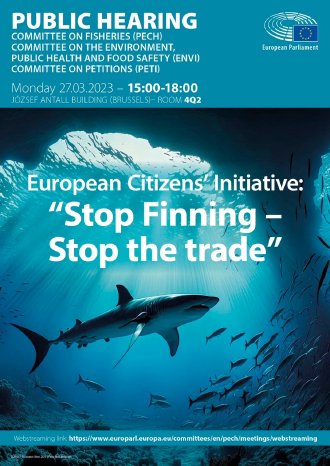The EU’s “Fins Naturally Attached” regulation states that the fins shall not be removed from the body of the shark at sea. However, fins may be cut off after landing, and this makes it possible to trade and export detached fins.
In many other regions of the world, including the majority of the Atlantic, cutting of fins at sea is still allowed. In fact, finning is known to continue globally and in EU waters because the level of surveillance at sea is inadequate and offenses are difficult to detect and prosecute. It is evident that the fins of threatened and protected species, such as those listed on CMS App I and CITES App I or II, continue to be traded illegally on a regular basis, as it is nearly impossible to identify many thousands of tons of detached fins down to the species level.
To close these loopholes, new trade regulations must be introduced banning the export, import and transit of all detached fins of sharks and rays! The marine ecosystems need your voice and vote!
Why is this so important?
- Healthy oceans support a blue economy of ocean-based tourism [3], fisheries [4] and food security [5].
- The oxygen in every second breath we take is derived from the oceans [6].
- Sharks are vital for healthy marine ecosystems, and their extinction would have far-reaching negative impacts on marine ecosystems [7].
- Resilient marine ecosystems and biodiversity are essential carbon sinks and inevitable to combat climate change [8].
- Ocean health and stopping the loss of biodiversity are high priorities of the EU Green Deal [9] and the EU Biodiversity Strategy [10].
- More than 100 million sharks are killed every year, mainly for their fins [11].
- Spain, Portugal, and France are among the top 15 shark-fishing nations of the world [12] and fishing operations are, in many cases, subsidized with EU taxpayers’ money [13].
- Although the EU is obliged under CITES [14] and CMS [15] to regulate the trade of listed species, fins of these threatened/protected sharks and rays are still entering the market due to current inadequate legislation and controls by the EU [16].
- A legal market for shark fins creates a loophole for illegal fins, as origin and species are difficult to trace [17]. Detached shark fins can mostly only be identified with time-consuming and expensive DNA tests [18].
Please support the demand during the upcoming debate by speaking up for shark conservation and by voting for a resolution that bans the trade of detached fins in the EU!
1.1 million EU citizens and the civil society count on you.
[1] Dulvy. et al., 2021
[2] Pacoureau, Rigby, Kyne et al., 2021 und Dulvy et al., 2017
[3] Torres et al., 2017
[4] Hammerschlag, 2019
[5] Pauly et al., 2017; FAO, several reports 2020
[6] NOAA, 2021; NASA - Earth Observatory, 2017
[7] Hammerschlag et al.,2017; Baum und Worm, 2009
[8] Atwood, et al., 2015
[9] European Commission, Website European Green Deal, accessed in August 2022; European Commission, KOM(2021) 240 final
[10] https://www.eea.europa.eu/policy-documents/eu-biodiversity-strategy-for-2030-1
[11] Worm et al., 2013.
[12] Traffic, 2019
[13] Regulation 2003/96/EG Council; Vorschlag der Europäischen Kommission für eine Richtlinie des Rates KOM(2021) 563 final, 2021/0213 (CNS)
[14] Convention on International Trade in Endangered Species of Wild Fauna and Flora (CITES), Articel I - III, Appendices I - III; https://cites.org/eng/news/record-number-of-species-to-be-regulated-by-cites-after-cop19
[15] Convention for the Conservation of Migratory Species (CMS)
[16] Felder et al., 2017; Giovos et al., 2019
[17] Felder et al., 2017; Giovos et al., 2019
[18] Feitosa, Martins, Giarrizzo et al., 2018; Sembiring, 2015.
[19] https://www.worldbank.org/en/news/infographic/2017/06/06/blue-economy
[20] Canada: Bill S-238 (Historical) | openparliament.ca; UK: https://bills.parliament.uk/bills/3207;
Austria: https://www.parlament.gv.at/PAKT/PR/JAHR_2022/PK1466/#,
US: https://www.congress.gov/search?q=%7B%22source%22%3A%22legislation%22%2C%22search%22%3A%22shark%20fin%22%7D


